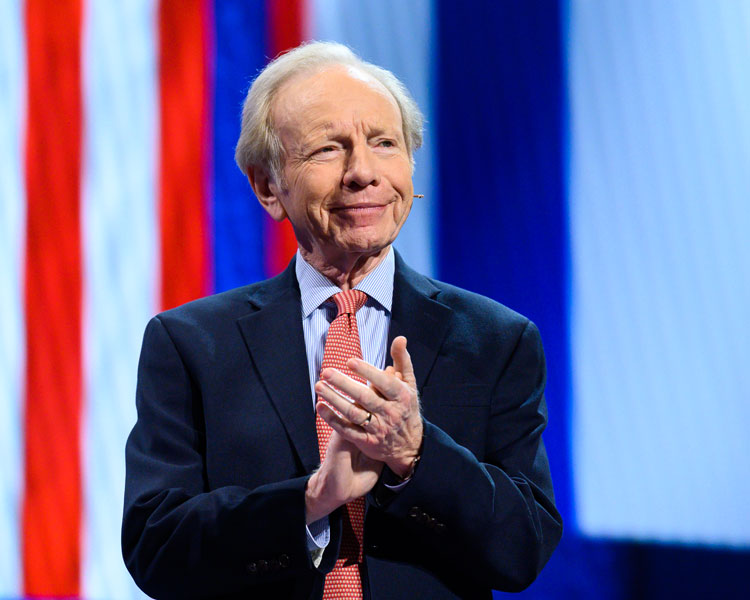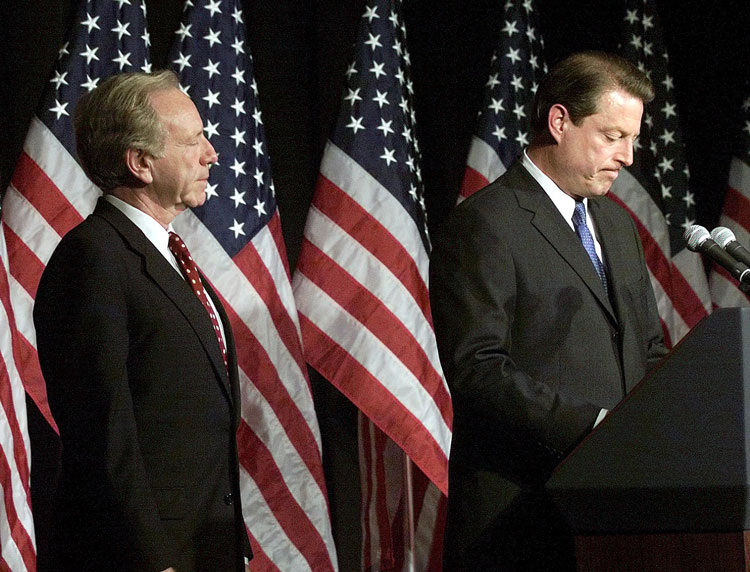Joe Lieberman reflects on 50 years in law and politics, 'recounts' Bush v. Gore

“I knew I wanted to go back to practicing law,” says Joe Lieberman, who is now senior counsel at Kasowitz Benson Torres, a firm known for its representation of Donald Trump before and during his presidency. Photo by Michael Brochstein/SOPA Images/LightRocket via Getty Images.
I tell Joe Lieberman that I want to start out by playing “Joe Lieberman trivia.” The former longtime senator from Connecticut laughs. He’s up for it.
In 1968, Joseph I. Lieberman was a second-year lawyer. He and two colleagues at New Haven’s Wiggin & Dana, represented a party before the U.S. District Court for the District of Connecticut. It led to a published opinion. “Senator, can you name that case?”
“I have no idea,” Lieberman says, after pondering it for a moment.
I turn over the card. The Wiggin & Dana trio represented Playboy in a breach of contract action. The magazine publisher had agreed to send one of its playmates to a men’s clothing store in Bridgeport for a promotional event. The store owner paid the required $136.50. But the bunny-clad guest was a no-show. The retailer sued. Team Lieberman was not successful in having the complaint dismissed based on lack of personal jurisdiction.
“I have zero recollection of that,” Lieberman says, guessing that his involvement was limited to some research on the case, after I tell him the names of his co-counsel.
“I think I have a pretty good memory,” he says. And, adding with amusement: “You’d think I’d remember that.”
During an hourlong phone interview from his home in the Riverdale section of the Bronx, Lieberman proved his point, demonstrating a spectacular recall of events in his five-decade career as a lawyer and politician. And in one case, he went back even further. The story was ancient history. But it offers a lesson for the legal profession today.
At the time of our discussion, President Donald Trump has lawsuits pending in various courts alleging fraud and other voting irregularities in this year’s presidential election. Lieberman has some familiarity with litigation of this sort.

Joe Lieberman says he didn’t give tactical advice to the lawyers mounting the legal challenges in Bush v. Gore. Photo by Luke Frazza/AFP via Getty Images.
Recounting a landmark case
I ask the 78-year-old former 2000 Democratic nominee for vice president about his role in Bush v. Gore—the landmark U.S. Supreme Court decision over the counting of Florida’s votes. The Florida Supreme Court had ordered a statewide recount to address thousands of votes where the voter’s preference could not be determined.
The U.S. Supreme Court halted the recount on equal protection grounds: There was no uniform standard for the state’s counties to determine the voter’s choice. The ruling from the nation’s top court set the stage for the election of George W. Bush. Given his background as a lawyer, was Lieberman more than just a litigant in one of the most important lawsuits of all-time?
He tells me he didn’t give tactical advice to the lawyers mounting the legal challenges. Rather, Lieberman says, he was “engaged” in “legal strategy decisions” over the campaign’s course of action.
“I’ll give you a little anecdote,” he offers. On the Saturday after Election Day, Lieberman attended a meeting at Vice President Gore’s residence. Several campaign officials were present, and decisions were going to be made over which lawsuits to pursue over the undecided election.
Owing to an approach that he says he developed as Connecticut Attorney General in the 1980s, Lieberman tells me that he advocated for filing a wide range of legal actions. The candidate’s view was that “if you believe you have a cause of action that has a reasonable basis to it—although you are obviously not sure if you can convince the judge or judges or jury—take it to court. That’s what our system gives us the right to do. Let the judge decide. That’s what I argued.”
But not everyone around the table was on board with such an aggressive line of attack. Lieberman reveals that during a break, an attendee pulled him aside and cautioned him to tread lightly. The unsolicited advice: “Be careful. You and Al Gore are young men and have a great future ahead of you. Don’t be so litigious here that people think you are both sore losers.”
Lieberman says he looked at the person and responded, incredulously: “I can’t believe you are saying this. This is really important. I wouldn’t say to file baseless lawsuits. But a number of these have a basis.”
“Maybe I [won the argument] around the edges a bit with some of the lawsuits,” Lieberman concludes. “But not all the lawsuits that I thought were plausible, and should be filed, were filed.”
On the currently pending election litigation, Lieberman says: “You have the right to go to court. But at some point, this has to end for the good of the country.” This thinking, he says, was at the heart of Gore’s decision to end the election litigation after SCOTUS spoke, despite other avenues of pursuit possibly being available to the campaign.
I’m curious if people still come up to Lieberman to discuss the 2000 election. “They do,” the former candidate tells me, often wanting to talk about how things may have been different, such as on climate change and the war in Iraq.
Life after the Senate
Lieberman left the Senate in 2013 after 24 years. Despite more than a decade in private practice, and six years as Connecticut’s attorney general, the Yale Law School graduate chose not to serve on the Judiciary Committee. He credits his decision to advice he got early on from a more experienced colleague: “It’s just one of the more partisan, ideologically divided committees. … You are not going to enjoy it. You can really make a difference on the environment committee.”
“Judiciary is a partisan committee?” I reply.
Lieberman laughs. “How ‘bout that?”
Since departing the world’s most exclusive club, Lieberman has been senior counsel at Kasowitz Benson Torres in the firm’s Manhattan office.
“I knew I wanted to go back to practicing law,” he says. “I dreamed of being in the Senate when I was younger. I was lucky enough to live the dream. But I never wanted to finish my life there. I wanted another chapter.”
He joined the firm to help it set up a government affairs practice and provides advice on a variety of issues, including public policy, regulatory, national security and environmental. He also represents clients in internal and independent investigations.
Lieberman tells me he spoke to about 10 firms when deciding where to practice. Oddly, it seems the man who was a few hanging chads away from being a Democratic vice president landed at the firm whose founder, Marc Kasowitz, is well-known for his representation of Donald Trump, both before and during his time in the White House.
Lieberman says he sometimes gets asked if that’s uncomfortable. Not at all, he tells me. “I’m senior counsel. He’s doing his thing. I’m doing mine.”
A Yale man and a 60-year-old lesson
In 1963, a student group at Yale University invited George Wallace to speak on campus. The university’s president, Kingman Brewster Jr., uninvited the Alabama governor known for his segregationist views and efforts to prevent the enrollment of Black students at the University of Alabama.
At the time, Lieberman was a Yale undergraduate and served as chairman (equivalent of editor-in-chief) of the school’s newspaper, the Yale Daily News. He penned an editorial criticizing the administration’s decision to keep Wallace off the campus.
“We’re a university,” Lieberman says, explaining his reasoning to me. “And we have to be open to ideas, even ones that are as repulsive to me as Wallace’s.”
The former editor connects that event from almost 60 years ago to today. “I do think about that personal experience very often when I see speakers of one ideology or another being shouted down by students and forced out. It’s wrong. It’s not what the university is supposed to be. Go listen to them and argue with them. But they’re not happy with that.”
The Wallace incident offers another present-day parallel—this one for lawyers.
Lieberman believed Brewster’s decision to keep Wallace out was effected by the mayor of New Haven, who was “worried that there was going to be civil unrest.” To Lieberman, that wasn’t a reason to keep Wallace out. He didn’t believe any disturbances would go beyond the university. But if they did, he tells me, “that’s why the police are there.”
That the risk of dissent led the Yale president to abandon a core mission of a university sounds familiar. These days, some lawyers are facing public scorn and even risks to their safety for their pursuit of a fundamental principle of their own profession—representation of unpopular clients.
Some lawyers representing President Trump or those aligned with him in post-election litigation have witnessed large-scale protests outside their office windows. Earlier this year lawyers representing clients seen hostile to housing rights have faced vandalism to their home or office.
There is nothing new about lawyers taking heat for representing unpopular clients and causes. But, historically, those who found it distasteful let it go at that—just part of the system. But this feels different. Now, those representing lightning-rod clients runs the risk of an internet and social media lambasting, with possible attendant business consequences. Surely this will cause some lawyers to abandon the profession’s time-honored tradition—everyone is entitled to representation—out of the fear of the potential repercussions.
To a once 21-year-old with the conviction to publicly call out the president of Yale University for not allowing an avowed segregationist to speak on campus, this is a worrisome trend for lawyers.
“The next step from the corrosive partisanship that has infected our politics,” Lieberman explains, “involves a self-righteousness—‘I’m so right that I don’t care about the idea that this is a rule-of-law country, and we work out our disputes in court.’
“Of course lawyers represent clients that they might not totally agree with,” Lieberman says, “but to go around that system of law, which has made us the unique country we are, and to punish lawyers who are representing clients who may be controversial is really a very dangerous development and one that ought to be resisted.”
For Joe Lieberman, it has been a long career filled with accomplishments—and one gigantic what-could-have-been. “I remember the 2000 election more than the Playboy case,” he says, laughing.

Randy Maniloff is an attorney at White and Williams in Philadelphia and an adjunct professor at the Temple University Beasley School of Law. He runs the website CoverageOpinions.info.



